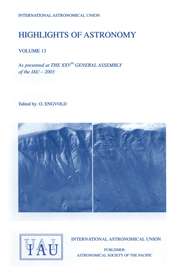No CrossRef data available.
Article contents
Space Astrometry - Its Impact on Astronomy and Astrophysics-Introductory Comments
Published online by Cambridge University Press: 30 March 2016
Extract
Astrometry - the determination of positions, motions, and coordinate systems and the entirety of the products of these observations- was the first specialty in astronomy. The value of astrometry for all of the fields of astronomy does not have to be emphasized here; it is clear that the foundation of astronomy and astrophysics is provided by astrometry. What is perhaps not so clear is the fact that, although considerable progress has been made in the seventies, the numerical estimates for many of the basic quantities are much less certain than the average user realizes. Fortunately, astrometry stands at the brink of a technological revolution, involving both ground-based and space techniques. Once completed, this will lead to one or more orders of magnitude improvement in both the precision and quantity of most astrometric observations, with enormous implications for other fields of astronomy.
- Type
- Joint Commission Meetings
- Information
- Copyright
- Copyright © Cambridge University Press 1980


